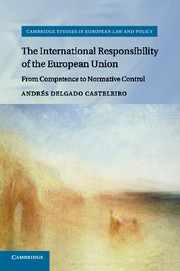Book contents
- Frontmatter
- Contents
- Series Editors' Preface
- Acknowledgements
- Introduction
- 1 The EU's Normative Control and International Responsibility
- 2 Codifying of the Responsibility of International Organizations (I): The Impact of ARIO's Rules of Attribution on the EU
- 3 Codifying of the Responsibility of International Organizations (II): The Impact of ARIO's Rules of Responsibility on the EU
- 4 EU Declarations of Competence to Multilateral Agreements: A Useful Internal Reference Base?
- 5 The Apportionment of the EU's International Responsibility in International Environmental Law: The International Application of EU Declarations of Competence
- 6 The EU's Normative Control and International Responsibility: The WTO Dispute Settlement System
- 7 Normative Control in the EU and the Responsibility of Member States: An Analysis of the Responsibility of the EU in International Investment Law
- Conclusions
- Bibliography
- Index
2 - Codifying of the Responsibility of International Organizations (I): The Impact of ARIO's Rules of Attribution on the EU
Published online by Cambridge University Press: 05 September 2016
- Frontmatter
- Contents
- Series Editors' Preface
- Acknowledgements
- Introduction
- 1 The EU's Normative Control and International Responsibility
- 2 Codifying of the Responsibility of International Organizations (I): The Impact of ARIO's Rules of Attribution on the EU
- 3 Codifying of the Responsibility of International Organizations (II): The Impact of ARIO's Rules of Responsibility on the EU
- 4 EU Declarations of Competence to Multilateral Agreements: A Useful Internal Reference Base?
- 5 The Apportionment of the EU's International Responsibility in International Environmental Law: The International Application of EU Declarations of Competence
- 6 The EU's Normative Control and International Responsibility: The WTO Dispute Settlement System
- 7 Normative Control in the EU and the Responsibility of Member States: An Analysis of the Responsibility of the EU in International Investment Law
- Conclusions
- Bibliography
- Index
Summary
Introduction
Undoubtedly, the discussion on the EU's international responsibility must be put in the wider context of the proliferation of multilateral agreements and the IOs’ rise in international law. By way of example, most existing multilateral agreements have been negotiated and concluded under the auspices of an IO. Similarly, apart from being institutionalized structures in which States cooperate, IOs have the capacity to adopt legal acts and also conclude international agreements with other international subjects.
However, this proliferation of IOs seems to entail a high political price. The creation of IOs has led to a situation where they exist as legal subjects, but lack accountability and responsibility; this, in turn, leads to an increase in normative and jurisdictional conflicts and the fragmentation of the international legal order. Moreover, the evolution of the role that these subjects develop in the international arena has not been accompanied by an evolution of the mechanisms required to hold them internationally responsible.
Rather than providing reparations, the discussions on the responsibility of IOs are more concerned with the allocation of powers between the State and the IO. As a consequence, most of the issues regarding IOs’ responsibility (or lack of it) will revolve around the issue of the attribution of a particular conduct, either to the IO or to its Member States. As happens with many of the issues concerning IOs, the regulation of their responsibility under international law shows the existing tension between their autonomous character and their functional nature. Thus, the basic issues regarding the responsibility of IOs will touch upon the role of its Member States in relation to the commission of the internationally wrongful act and more specifically, to what extent the IO veil covers the actions of its Member States. Logically, all these issues have been the focus of the discussions about the ARIO.
It is against this background that not only the EU's international responsibility is analysed, but also the codification process carried out by the ILC on the responsibility of IOs. This chapter examines how the rules of attribution enshrined in the ARIO apply to the EU and its Member States. Even though the EU appears to be an IO like no other, most of the problems revolving around the EU's international responsibility are dealt with in one way or another in the provisions of the ARIO.
- Type
- Chapter
- Information
- The International Responsibility of the European UnionFrom Competence to Normative Control, pp. 54 - 78Publisher: Cambridge University PressPrint publication year: 2016

